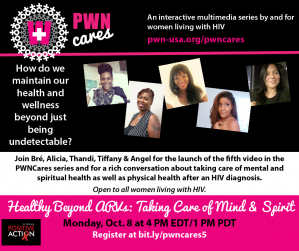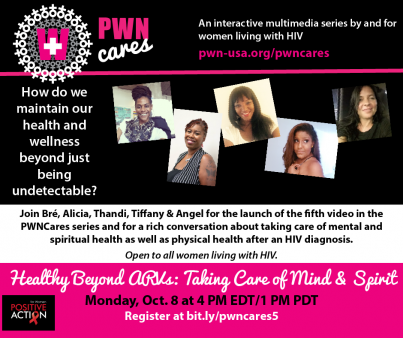**FOR IMMEDIATE RELEASE**
Contact: Jennie Smith-Camejo, jsmithcamejo@pwn-usa.org, 347.553.5174
The fifth video in the #PWNCares series will premiere Monday, Oct. 8, in a live “virtual coffee table” video chat with the 5 women interviewed in it. It will come with a discussion guide to facilitate use in support groups, meetings, events, and other settings.

September 21: October 7-13 is Mental Illness Awareness Week—an occasion to bring mental health out of the shadows, talk about it, and, in so doing, combat the stigma it brings.
Monday, October 8, at
Register for the virtual coffee table chat here.
Women living with HIV suffer from post-traumatic stress disorder (PTSD) at a rate five times higher than the general population and have twice the rate of depression. Already facing the stigma associated with HIV, subjecting themselves to the extra stigma of talking about mental health challenges can feel like too much.
Unfortunately, not talking about mental health struggles doesn’t make them go away. That’s why five fiercely resilient women living with HIV courageously stepped up and agreed to share their own experiences with mental health for the fifth video and virtual coffee table chat in the #PWNCares series produced by Positive Women’s Network – USA (PWN-USA), a national membership organization of women living with HIV.
The full video, which will be premiered during the virtual coffee table, will be available for streaming and download on our website here, along with a discussion guide that may be helpful for use in support groups, women’s meetings, health care settings, or other events. Watch the trailer above.
In their interviews, Bré, Alicia, Thandi, Tiffany, and Angel candidly describe their personal struggles with mental health concerns including depression, anxiety, PTSD, and suicidal ideation, as well as ways they have found to cope and heal—and recommendations for individuals, health care providers, and policymakers.
During the virtual coffee table chat, they will take questions from participants, who can participate anonymously, share more context on what they discussed in their interviews, and support participants who wish to share their own challenges and successes. The virtual coffee table chat is open to all women living with, affected by and/or working with people living with HIV. Journalists wishing to cover PWNCares may join the coffee table, which will also be recorded and available on our website here later, but are asked to quote by name only the women featured in the video.
“I agreed to be interviewed on this very important topic to share with women living with HIV how important it is to not just take care of others but also to practice self-care,” explained Alicia Diggs of North Carolina, one of the women featured in the new video. “As we take care of everything and everyone, we often unknowingly neglect ourselves so much that it affects us physically, emotionally, and mentally. My hope is that newly diagnosed women and women who feel isolated take the pearls of wisdom shared in this virtual coffee table chat and apply it to their lives so that they can take care of their mental health and wellness.”
“Now that women are living longer,” added Thandi Harris, another woman interviewed in the video, “there is a mental component attached to HIV that is barely talked about: depression.”
#PWNCares is an interactive series by and for women living with HIV, made possible by a Positive Action for Women grant from ViiV Healthcare, that combines the wisdom and expertise that come from lived experience with multimedia technology to connect and support recently diagnosed and/or isolated women living with HIV as they seek answers to the questions an HIV diagnosis brings. Topics for the video series and online discussions were sourced from PWN-USA members, all women living with HIV, including women of trans experience.
“Feeling alone is a major barrier to engagement and retention in care,” explained Naina Khanna, executive director of PWN-USA. “Many women, especially outside of major urban centers, may not know any other women living with HIV. Our goal is to provide them the tools, knowledge
See and download all the videos, discussion guides, recorded virtual coffee tables, and more at pwn-usa.org/pwncares.
###
Positive Women’s Network - USA is a national membership body of women living with HIV and our allies that exists to strengthen the strategic power of all women living with HIV in the United States. Founded in 2008 by 28 diverse HIV-positive women leaders, PWN-USA develops a leadership pipeline and policy agenda that applies a gender lens to the domestic HIV epidemic grounded in social justice and human rights.
Every day we inspire, inform, and mobilize women living with HIV to advocate for changes that improve our lives and uphold our rights. In addition to federal advocacy, PWN-USA supports regional organizing and leadership development at a local and state level.








Comments
Comments